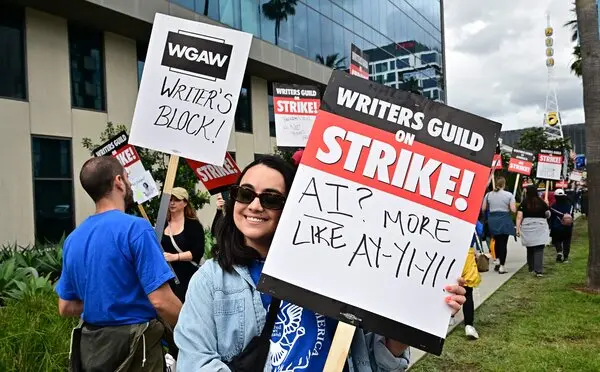
After 146 days of fierce marching, huge banners, and clever picket-signs, the Writer’s Guild of America (WGA) and the Alliance of Motion Picture and Television Producers (AMPTP) has announced that an agreement has finally been reached (Vox).
The provisions in the new deal with the WGA makes evident that the union proved successful. The contract includes: increases to minimum wage, increased pension, increased health fund rates, better length of employment, larger writing teams, and better residuals (which is especially important in this era of streaming media) (Vox). We also cannot forget the elephant in the room—the use of artificial intelligence. The deal prohibits forcing writers to use AI, using AI to edit or write scripts already written by a writer, or treating AI content as “source material” (The Guardian).
However, this does not mean that all strikes have miraculously ended. The Screen Actors Guild – American Federation of Television and Radio Artists (SAG-AFTRA), are still holding up their picket-signs. SAG-AFTRA—also protesting for better wages and protections from AI—have yet to reach an agreement with the WGA. Until then, actors of Hollywood still fear encroachments from AI to their beloved profession (The Guardian).
Now, what does this mean for the common TV aficionado who has mourned the delay of their favorite shows and films? Though TV production cannot not start up immediately, there has been some set dates to look forward to. For starters, day and night-time talk shows, like The Drew Barrymore Show, The Kelly Clarkson Show, and the familiar faces of Jimmy Kimmel, Jimmy Fallon, and Seth Meyes, will return on the TVs with our much loved celebrities in the beginning weeks of October (Vox). Some big-name shows have been labeled as “priority” for studios, like Stranger Things, Euphoria, House of the Dragon, and Wednesday. These are the projects that studios will focus on to “fast-track” back into production (Variety). Next, for the movie buffs. Developments for the sequel of Batman, Mission: Impossible – Dead Reckoning, and Deadpool 3, have been put back on course (Variety). Not only that, some new arrivals, such as: Killers of the Flower Moon, The Marvels, and The Hunger Games: The Ballad of Songbirds & Snakes, will reach the box office in the following months.
In the midst of joy at seeing our favorite shows and movies come back, we must not forget to appreciate our writers in Hollywood. This strike thankfully stopped the dehumanization of writing in the entertainment industry. The future of entertainment in Hollywood could have looked like a bland mix of plagiarized writing fed into a machine. What makes watching TV and film so heartfelt and genuine is the lives and emotions of the writers reflected indirectly behind the script. Fellow students here at YLHS also share this sentiment, like Stacey Kim (11), who notes, “I’m happy the writer’s strike has come to a fair conclusion so I can go back to watching some of my favorite shows like Abbott’s Elementary. I know that the outcomes from Hollywood will be even better with fair accommodations.”
Students, especially ones with aspirations in Hollywood, should pay close attention to this colossal event. Machines should not dominate in an industry where creativity and human emotion thrives. It has become a reality that creative dream jobs children wished for growing up could not be available by the time they are adults—as they could be taken by AI. The writers have reached an agreement so far, but intrusions upon their protections could be tried again.



























